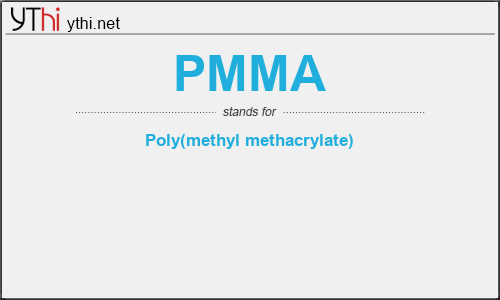What does PMMA mean? What is the full form of PMMA?
The Full Form of PMMA is Poly(methyl methacrylate).
Polymethyl methacrylate (PMMA) is a lightweight, synthetic polymer that is an economical alternative to polycarbonate when extremely high strength is not necessary. An advantage is that PMMA does not contain potential harmful subunits like bisphenol-A found in polycarbonate. Moreover, the synthetic polymer is easier to handle, process, and less expensive than polycarbonate. In practice, PMMA is often used for craniofacial tissue defects such as skin and dentures (Pielichowski and Njuguna, 2005).
PMMA has great mechanical properties and low toxicity. While being popular for hip-joint transplantations because of its inert properties, PMMA displays slow degradation (Ganesh et al., 1997). Therefore, creating a polymer blend of polycaprolactone with PMMA produces a polymer material that is better suited for biomaterial applications. In vitro studies conducted by So-Ra Son et al. 2013 used MTT assays to examine cytotoxicity and proliferation of MG-63 osteoblast cells on blended scaffolds of PCL/PMMA (Son et al., 2013). The study found the blended polymer material suitable for osteoblast cell proliferation. Further evidence of confocal images and expression of proliferation cell nuclear antigen confirmed proliferation and expression of cells in the 7:3 PCL:PMMA blended polymer environment. PMMA is a nonbiodegradable polymer utilized in applications that require permanent, mechanically stable structures such as bone tissue regeneration (Jessy and Ibrahim, 2014). At high temperatures, the long chain backbone of PMMA separates and reacts with itself to change properties. PMMA can undergo thermal degradation and thermal oxidative degradation in the presence of oxygen, as well as photodegradation, oxidative degradation, and UV degradation. Thermal degradation causes changes in properties of the polymer such as reduced ductility, chalking, color changes, and cracking. PMMA depolymerization at 300–400°C produces volatile monomers of methyl methacrylate (MMA) (Holland and Hay, 2001).
PMMA is used in biomaterial applications such as bone cement, lenses, bone substitutes, and drug delivery systems. It is used to remove wrinkles and scars on skin tissue permanently. In dental implants, polymer material PMMA is substituted for missing dental roots. Similar to the physical and mechanical qualities of human dentine, PMMA has a low modulus of elasticity, thermal and electrical passiveness, and ideal porosity (Leigh, 1975).
PMMA
means
Poly(methyl methacrylate)![]()
Translate Poly(methyl methacrylate) to other language.


Leave a Reply
You must be logged in to post a comment.